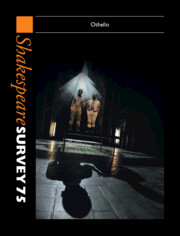Book contents
- Shakespeare Survey 75
- Shakespeare Survey
- Shakespeare Survey
- Copyright page
- Editor’s Note
- Contributors
- Contents
- Illustrations
- Understanding Iago, An Italian Film Adaptation Of Othello: Clientelism, Corruption, Politics
- Circumventing Marginality: The Curious Case Of India’s Othello Screen Adaptations
- Othello’s Kin: Legacy, Belonging And The Fortunes Of The Moor
- ‘More Fair Than Black’: Othellos On British Radio
- ‘This Fair Paper’: Othello And The Artists’ Book
- Othello: A Dialogue With The Built Environment
- ‘[A] Maid Called Barbary’: Othello, Moorish Maidservants And The Black Presence In Early Modern England
- ‘The Moor’s Abused By Some Most Villainous Knave, Some Base Notorious Knave, Some Scurvy Fellow’: Legal Spaces, Racial Trauma And Shakespeare’s The Tragedy Of Othello, The Moor Of Venice
- Ben Jonson’s Sejanus And Shakespeare’s Othello: Two Plays Performed By The King’s Men In 1603
- Iago And The Clown: Disassembling The Vice In Othello
- Pitying Desdemona In Folio Othello: Race, Gender And The Willow Song
- Desdemona’s Honest Friend
- Suffering Ecstasy: Othello And The Drama Of Displacement
- Othello’s Sympathies: Emotion, Agency And Identification
- Warning The Stage: Shakespeare’s Mid-Scene Entrance Conventions
- Looking For Perdita In Ali Smith’s Summer
- Grafted To The Moor: Anglo-Spanish Dynastic Marriage And Miscegenated Whiteness In The Winter’s Tale
- Rhyme, History And Memory In A Mirror For Magistrates And Henry VI
- ‘Bad’ Love Lyrics And Poetic Hypocrisy From Gascoigne To Benson’s Shakespeare
- Viola’s Telemachy
- New Analogical Evidence For Cymbeline’s Folkloric Composition In The Medieval Icelandic Ála Flekks Saga
- ‘But When Extremities Speak’: Harley Granville-Barker, Coriolanus, The World Wars And The State Of Exception
- Shakespeare Performances in England, 2021
- Shakespeare Performances in England, 2021
- Professional Shakespeare Productions In The British Isles, January–December 2020
- The Year’s Contribution To Shakespeare Studies
- Abstracts Of Articles In Shakespeare Survey 75
- Index
New Analogical Evidence For Cymbeline’s Folkloric Composition In The Medieval Icelandic Ála Flekks Saga
Published online by Cambridge University Press: 24 August 2022
- Shakespeare Survey 75
- Shakespeare Survey
- Shakespeare Survey
- Copyright page
- Editor’s Note
- Contributors
- Contents
- Illustrations
- Understanding Iago, An Italian Film Adaptation Of Othello: Clientelism, Corruption, Politics
- Circumventing Marginality: The Curious Case Of India’s Othello Screen Adaptations
- Othello’s Kin: Legacy, Belonging And The Fortunes Of The Moor
- ‘More Fair Than Black’: Othellos On British Radio
- ‘This Fair Paper’: Othello And The Artists’ Book
- Othello: A Dialogue With The Built Environment
- ‘[A] Maid Called Barbary’: Othello, Moorish Maidservants And The Black Presence In Early Modern England
- ‘The Moor’s Abused By Some Most Villainous Knave, Some Base Notorious Knave, Some Scurvy Fellow’: Legal Spaces, Racial Trauma And Shakespeare’s The Tragedy Of Othello, The Moor Of Venice
- Ben Jonson’s Sejanus And Shakespeare’s Othello: Two Plays Performed By The King’s Men In 1603
- Iago And The Clown: Disassembling The Vice In Othello
- Pitying Desdemona In Folio Othello: Race, Gender And The Willow Song
- Desdemona’s Honest Friend
- Suffering Ecstasy: Othello And The Drama Of Displacement
- Othello’s Sympathies: Emotion, Agency And Identification
- Warning The Stage: Shakespeare’s Mid-Scene Entrance Conventions
- Looking For Perdita In Ali Smith’s Summer
- Grafted To The Moor: Anglo-Spanish Dynastic Marriage And Miscegenated Whiteness In The Winter’s Tale
- Rhyme, History And Memory In A Mirror For Magistrates And Henry VI
- ‘Bad’ Love Lyrics And Poetic Hypocrisy From Gascoigne To Benson’s Shakespeare
- Viola’s Telemachy
- New Analogical Evidence For Cymbeline’s Folkloric Composition In The Medieval Icelandic Ála Flekks Saga
- ‘But When Extremities Speak’: Harley Granville-Barker, Coriolanus, The World Wars And The State Of Exception
- Shakespeare Performances in England, 2021
- Shakespeare Performances in England, 2021
- Professional Shakespeare Productions In The British Isles, January–December 2020
- The Year’s Contribution To Shakespeare Studies
- Abstracts Of Articles In Shakespeare Survey 75
- Index
Summary
Source analysis has long proven a productive tool in Shakespeare studies, given the breadth, abundance and variety of narrative traditions that Shakespeare demonstrably borrowed from and adapted. In addition to the insight that the study of identified sources can provide into the processes of narrative construction and adaptation in his plays, this approach also sheds valuable broader light on the dynamic literary and cultural mosaics of early modern England and Europe more widely. This, in turn, informs scholarly understanding of what types of stories or texts were known, being actively transmitted and reshaped, and resonating with contemporary readerships and audiences. Additionally, identifying and understanding Shakespeare’s sources can often usefully illuminate the chronological development and evolution of individual narrative traditions to which those sources belong, traditions which variously extend back to biblical, classical and medieval roots.1 Source analysis does have clear and obvious limitations, however. For one thing, the scale of influence on any text or author inevitably varies from source to source, meaning that filiation cannot always be posited conclusively. For another, Shakespeare is recognized to have collaborated actively with other playwrights, which complicates questions of direct influence.2 For a third, not all of Shakespeare’s (or his co-authors’) literary sources have survived. Then there is also the substantial matter of oral sources and traditions, of which little can be definitively known, barring the fortuitous survival of sufficient auxiliary evidence such as analogues. The murky uncertainties which arise from such issues are evident in the long debate over the nature of Hamlet’s relationship with the putative ‘ur-Hamlet’, which serves to exemplify both the accepted value of source identification and the extent of its limits.
- Type
- Chapter
- Information
- Shakespeare Survey 75Othello, pp. 287 - 312Publisher: Cambridge University PressPrint publication year: 2022

